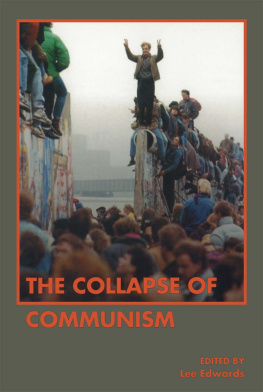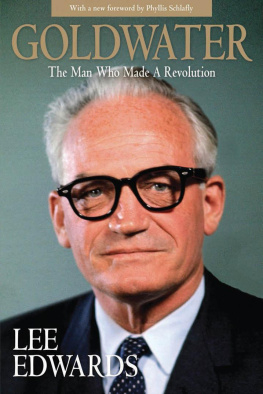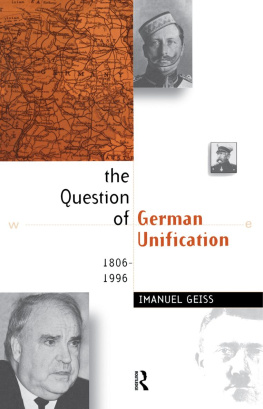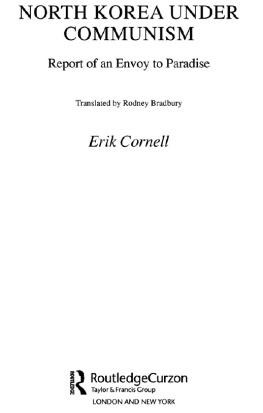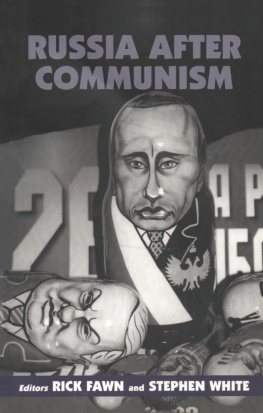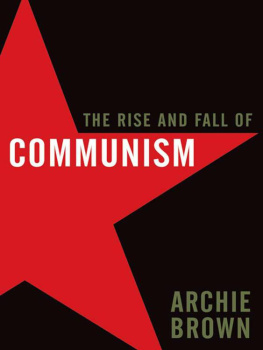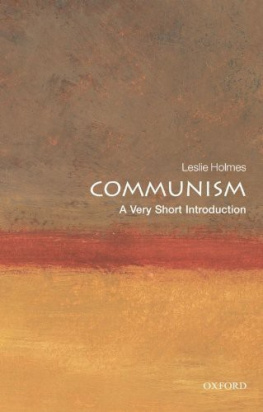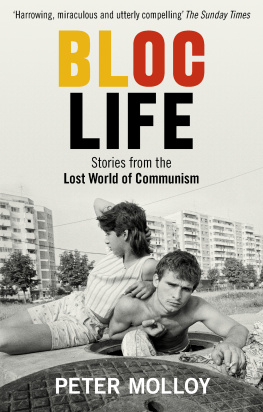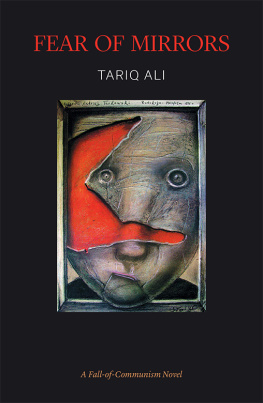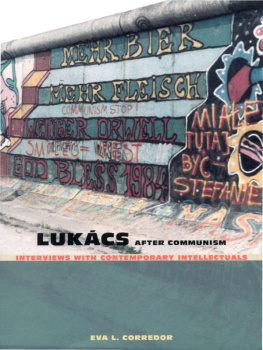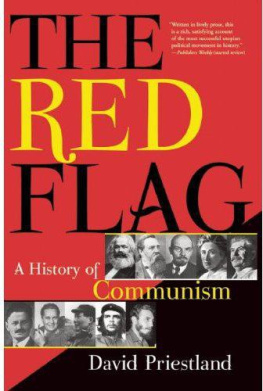The Hoover Institution on War, Revolution and Peace, founded at Stanford University in 1919 by Herbert Hoover, who went on to become the thirty-first president of the United States, is an interdisciplinary research center for advanced study on domestic and international affairs. The views expressed in its publications are entirely those of the authors and do not necessarily reflect the views of the staff, officers, or Board of Overseers of the Hoover Institution.
www.hoover.org
Hoover Institution Press Publication No. 473
Copyright 2000 by the Board of Trustees of the Leland Stanford Junior University
All rights reserved. No part of this publication may be reproduced, stored in a retrieval system, or transmitted in any form or by any means, electronic, mechanical, photocopying, recording, or otherwise, without written permission of the publisher.
For permission to reuse material from The Collapse of Communism, ISBN 978-0-8179-9812-7, please access www.copyright.com or contact the Copyright Clearance Center, Inc. (CCC), 222 Rosewood Drive, Danvers, MA 01923, 978-750-8400. CCC is a not-for-profit organization that provides licenses and registration for a variety of uses.
First printing, 1999
18 17 16 15 14 13 12 11 10 9 8 7 6 5
Manufactured in the United States of America
The paper used in this publication meets the minimum requirements of American National Standard for Information SciencesPermanence of Paper for Printed Library Materials, ANSI Z39.481984.

Library of Congress Cataloging-in-Publication Data
The collapse of communism / edited by Lee Edwards.
p. cm.
Includes bibliographical references and index.
ISBN-13: 978-0-8179-9812-7 (paperback)
ISBN-10: 0-8179-9812-8 (paperback)
1. CommunismHistory20th century. I. Edwards, Lee. HX40.C663 1999
335.43dc21
99-048364
CIP
CONTENTS
John Raisian
Lee Edwards
Lee Edwards
Zbigniew Brzezinski
Richard Pipes
Robert Conquest
Martin Malia
Michael Novak
Andrzej Brzeski
Brian Crozier
Paul Hollander
Index
FOREWORD
THE COLLAPSE OF COMMUNISM , epitomized by the fall of the Berlin Wall, is one of the defining features of the second half of the twentieth century. In the 1980s, Eastern Europe was under the control of communism. The dissolution of the Soviet Union changed everything. In the wake of the euphoria surrounding the fall of this totalitarian political and economic system, one is concerned that socialism will creep back into parts of Europe. It is our view that we should remind ourselves of the vagaries of communism in the hope that individual, political, and economic freedom will become entrenched in the former Soviet bloc.
The Hoover Institution has a long record of studying communism and collecting materials from East and Central Europe. The many archival treasures and research materials we possess in the Hoover Institution Archives include recent acquisitions of the entire broadcast archives of Radio Fee Europe/Radio Liberty and microfilm of more than twelve million pages of documentation from the Soviet Communist Party Archives.
In the Collapse of Communism, nine authors, immensely respected in the field, analyze communism in the twentieth century. The volume was conceived by Lee Edwards, who assembled this outstanding group of scholars to dissect why the system failed. They examine facts, myths, and theories, as well as politics and economics. This volume is comprehensive and, in our view, an indispensable guide and handbook for those interested in learning more about what led to the demise of communism in Europe. Not forgetting that experience is important for the future of freedom.
We want to thank Lee Edwards profusely for his enthusiasm and perseverance in assembling this volume in record time so it would be available by the tenth anniversary of the fall of the wall. It is a terrific collection.
We would like to thank Joan and David Traitel for their significant ongoing support of the Hoover Institution. David is a beacon not only in articulating the importance of history but in pushing the Institution to disseminate its scholarship, accurately portraying truth, not revisionism. David perpetually reminds us that we cannot forget what happened during the era of communism, lest we risk its return.
We call to your attention two other Hoover volumes. CNNs Cold War: Issues and Controversy (Hoover Press, 1999), edited by Arnold Beichman, assesses CNNs cold war documentary television program and related book, which generated significant controversy among some historians of the cold war period. In addition, Peter Schweizer edited The Fall of the Berlin Wall (Hoover Press, 1999). This volume focuses on the causes and consequences of the end of the cold war and complements the Collapse of Communism.
John Raisian
Director
Hoover Institution
Stanford University
ACKNOWLEDGMENTS
THIS BOOK would not have been possible without the generous support and professional assistance of the Hoover Institution, led by its inestimable director, John Raisian. I am deeply indebted to Patricia Baker, executive director of the Hoover Press, and her dedicated colleagues for accomplishing a not so minor miraclepublishing The Collapse of Communism in just two months. I also wish to thank Edwin J. Feulner, president of the Heritage Foundation, for his continuing support and Teri Ruddy for her editorial assistance. As always, I wish to acknowledge the contributions of Lev E. Dobriansky, Zbig-niew Brzezinski, Robert Conquest, Richard Pipes, and the other founders who have helped to make the Victims of Communism Memorial Foundation a reality.
CONTRIBUTORS
ANDRZEJ BRZESKI is a professor of economics emeritus at the University of California, Davis. A former prisoner in the Soviet Gulag, his latest publication (with Enrico Colombatto) is Can Eastern Europe Catch Up? (Post-Communist Economies).
ZBIGNIEW BRZEZINSKI , formerly national security adviser to President Carter, is a counselor at the Center for Strategic and International Studies and a professor of American foreign policy at the School of Advanced International Studies, the Johns Hopkins University.
ROBERT CONQUEST is a senior research fellow and scholar-curator of the Russian and CIS Collection at the Hoover Institution. His latest book is Reflections on a Ravaged Century (W. W. Norton).
BRIAN CROZIER is a distinguished visiting fellow at the Hoover Institution. He has been a writer and analyst of international affairs for more than fifty years. His latest book is The Rise and Fall of the Soviet Empire (Prima).
LEE EDWARDS is the president of the Victims of Communism Memorial Foundation. He teaches politics at the Catholic University of America and is a senior fellow at the Heritage Foundation.
PAUL HOLLANDER is a professor of sociology at the University of Massachusetts (Amherst) and a fellow at the Davis Center for Russian Studies at Harvard University. His latest book is Political Will and Personal Belief: The Decline and Fall of Soviet Communism (Yale University Press).
MARTIN MALIA is a professor of history emeritus at the University of California, Berkeley. His latest book is

